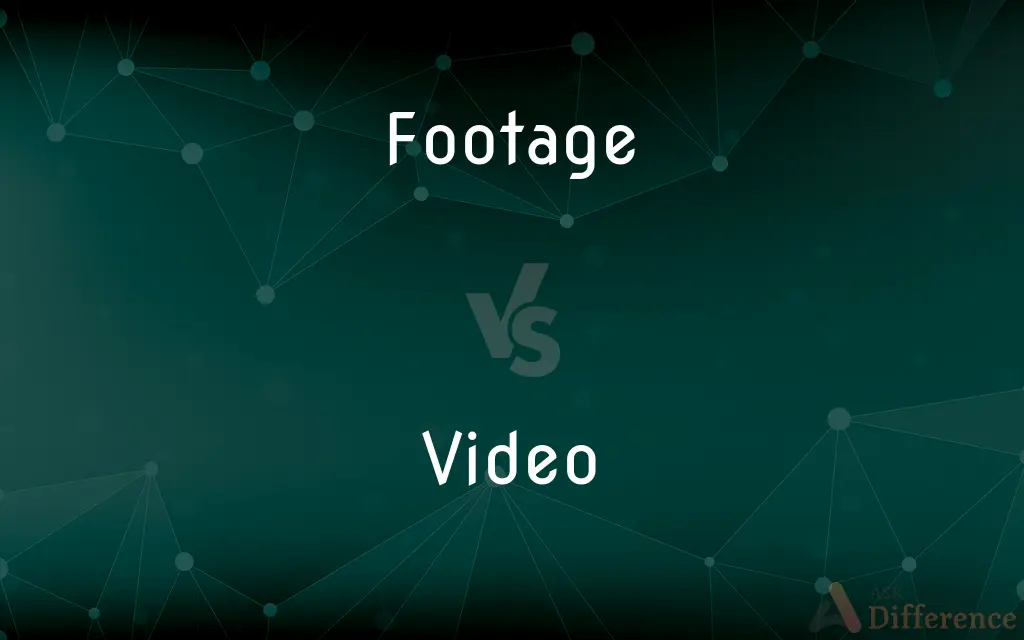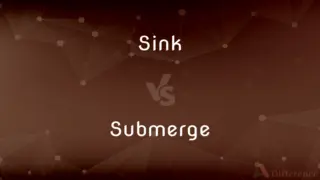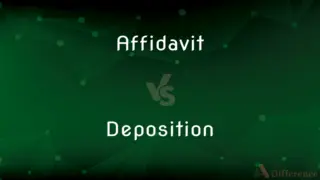Footage vs. Video — What's the Difference?
By Tayyaba Rehman & Urooj Arif — Updated on May 7, 2024
Footage refers to raw, unedited film material, while video encompasses both raw and edited content, generally in digital format. Footage is often used as a building block for creating final video productions.

Difference Between Footage and Video
Table of Contents
ADVERTISEMENT
Key Differences
Footage describes the raw, unprocessed recordings taken by a camera, traditionally on film reels or digitally. Video, on the other hand, refers to completed digital content, often edited, and can be live-streamed or recorded.
Footage is generally seen as the starting point of a production process, capturing the initial material for a film or video project. Meanwhile, video implies a more polished or finalized piece that can be streamed, broadcast, or shared.
In filmmaking, footage is used to describe rushes or clips that haven't yet been edited into a cohesive form. In contrast, video signifies a complete work that can be distributed for viewing, either commercially or personally.
Footage is often associated with specific moments captured from an event or scene, usually organized for further editing. Video, however, is usually consumed by viewers as a continuous or segmented narrative in its final form.
Footage often conveys the raw content that requires post-production and editing to deliver a meaningful story, whereas video is generally ready to be shared on social media, streaming platforms, or in cinematic contexts.
ADVERTISEMENT
Comparison Chart
Definition
Unedited film material
Finalized or edited digital media
Editing State
Unedited/raw
Edited or processed
Format
Usually film reel or digital clips
Primarily digital format
Usage Context
Pre-production phase
Post-production or final distribution
Accessibility
Mostly for editors/filmmakers
Publicly or privately shared
Compare with Definitions
Footage
Unprocessed material filmed by a camera.
The director reviewed hours of raw footage to find the best shots for the film.
Video
Digital content, often edited or processed for distribution.
They watched a short video explaining the new software features.
Footage
Initial, unedited clips from an event or scene.
News agencies quickly released raw footage from the disaster site.
Video
A completed work ready for sharing or viewing.
The company released a promotional video for their new product line.
Footage
Scenes or segments shot during the filmmaking process.
Some of the action sequences required days of extra footage to get the perfect shot.
Video
Streaming or recorded digital content for consumption.
The latest music video quickly became viral on social media.
Footage
Original film reels or digital captures that require editing.
The documentary relied on historical footage from wartime archives.
Video
Edited digital or film media formatted for final consumption.
Video production requires skillful editing and visual effects.
Footage
Camera recordings for further editing in video production.
The team is gathering more footage to complete the wildlife documentary.
Video
A collection of moving images and audio in digital or film format.
Her travel video documented the highlights of her trip around Europe.
Footage
In filmmaking and video production, footage is raw, unedited material as originally filmed by a movie camera or recorded by a (often special) video camera, which typically must be edited to create a motion picture, video clip, television show or similar completed work. Footage may also refer to sequences used in film and video editing, such as special effects and archive material (for special cases of this, see stock footage and B roll).
Video
Video is an electronic medium for the recording, copying, playback, broadcasting, and display of moving visual media. Video was first developed for mechanical television systems, which were quickly replaced by cathode ray tube (CRT) systems which were later replaced by flat panel displays of several types.
Footage
Length, extent, or amount based on measurement in feet
Estimated the square footage of new office space.
Video
A sequence of images processed electronically into an analog or digital format and displayed on a screen with sufficient rapidity as to create the illusion of motion and continuity.
Footage
Recorded film or video, especially of a specified nature or subject
News footage.
Detailed footage of the royal wedding.
Video
A signal carrying such images.
Footage
An amount of film or tape that has been used to record something.
The footage we shot at the riot yesterday got ruined.
Video
A movie recorded electronically, usually including a soundtrack
A video of a birthday party.
Footage
A measurement in feet.
Video
The presentation of such a work.
Footage
The amount of film that has been shot.
Video
The electronic medium in which such movies are recorded
A movie released on video.
Footage
A rate of charging by the linear foot of work done.
Video
A music video.
Footage
The amount of film that has been shot
Video
Television, television show, movie.
Footage
A rate of charging by the linear foot of work done
Video
A short film clip, with or without audio (as in a music video, or one of the plethora of user-generated short movies on sites such as YouTube).
We made a video montage of Robbie for his fiftieth birthday.
Check out my new videos on YouTube.
Video
Motion picture stored on VHS or some other format.
Video
(dated) VHS.
Video
(Britain) To record using a video camera, to videotape
Video
(Britain) To record a television program
Video
(ambitransitive) To visually record (activity, or a motion picture) in general, with or without sound.
Video
The visible part of a television transmission;
They could still receive the sound but the picture was gone
Video
A recording of both the video and audio components (especially one containing a recording of a movie or television program)
Video
Broadcasting visual images of stationary or moving objects;
She is a star of screen and video
Television is a medium because it is neither rare nor well done
Common Curiosities
What formats are common for footage?
Footage can be in analog film reels or digital clips, depending on the recording equipment used.
Is footage always unedited?
Yes, footage is generally raw and unedited, serving as the initial content to be edited into a finished video.
Does video always require editing?
Video typically involves some degree of editing, though live streaming and unedited videos can be exceptions.
What's the difference between video clips and footage?
Video clips are typically edited segments of a final video, while footage is unprocessed camera recordings.
Is footage used outside filmmaking?
Yes, footage is common in news, security, and surveillance contexts where raw recordings capture important events.
Can video include raw footage?
Video can include raw footage but often involves editing, graphics, and other elements to create a finalized product.
Are video and film the same?
Video refers to digital media, while film often indicates analog reels or high-quality cinema productions.
Is video easier to produce than footage?
Video production may seem easier due to editing, but raw footage requires skillful shooting for effective video creation.
Can video be analog or digital?
Video is predominantly digital now, but analog formats like VHS also exist.
Can footage be used directly as video?
While possible, raw footage usually needs editing for clarity and continuity before becoming a viewable video.
Does all footage need editing?
Generally, yes, to create a cohesive and polished video, editing is required for footage.
Are video and audio the same?
No, video refers to visual content with optional audio, whereas audio solely focuses on sound recordings.
Is all video footage-based?
Video often relies on original footage but can include graphics, animations, and other media types.
Do live broadcasts count as video or footage?
Live broadcasts are video but can become footage if recorded and later edited.
Can footage be old or historical?
Yes, footage can include historical recordings that document events, archived for reuse in new projects.
Share Your Discovery

Previous Comparison
Sink vs. Submerge
Next Comparison
Affidavit vs. DepositionAuthor Spotlight
Written by
Tayyaba RehmanTayyaba Rehman is a distinguished writer, currently serving as a primary contributor to askdifference.com. As a researcher in semantics and etymology, Tayyaba's passion for the complexity of languages and their distinctions has found a perfect home on the platform. Tayyaba delves into the intricacies of language, distinguishing between commonly confused words and phrases, thereby providing clarity for readers worldwide.
Co-written by
Urooj ArifUrooj is a skilled content writer at Ask Difference, known for her exceptional ability to simplify complex topics into engaging and informative content. With a passion for research and a flair for clear, concise writing, she consistently delivers articles that resonate with our diverse audience.














































